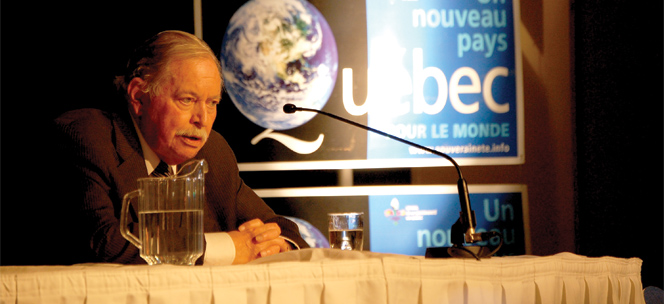Jacques Parizeau's not-so-glorious legacy

Former Quebec premier Jacques Parizeau died in early June. While the rest of Canada remembers him most for his infamous quote about “money and the ethnic vote” after losing the 1995 referendum, Quebec remembers him as the man who built the province we know today. They’re right: he is one of the main reasons why La Belle Province isn’t so “pretty.”
Like many economists of his time (early 1960s) he was a Keynesian, i.e. a believer in the intervention of government in the economy. He used that power to finalize electricity nationalization with Hydro-Québec, which became a success … thanks to oil shocks. Otherwise those massive expenditures on dams would have ruined the province. HQ gave government its first dividend nearly 20 years after its inception; no sane private business would have waited for so long to yield a profit. (Photo: Marianni/Foter/CC BY)
Parizeau tried the same scheme with asbestos by nationalizing 55% of asbestos producers under the Société nationale de l’amiante (SNA) when he was finance minister under René Lévesque. The SNA’s avowed goal was to produce more asbestos product in Quebec rather than just exporting raw fibres. Not only was it a financial disaster (the product is now banned in most industrialised countries) but it was based on the faulty assumption that an economy can thrive only through manufacturing.
Parizeau apparently skipped Comparative Advantage 101 when he studied at the London School of Economics. Otherwise he would have known that Quebec’s advantage lies in the exploitation of natural resources.
According to data from the ministère des Ressources naturelles, Quebec exploits one quarter of all natural elements. Unfortunately, Quebec’s low population density makes it impractical to consume these resources domestically, so they need to be exported. Do Albertans absolutely want to force oil to be refined within the province or do they want to export it? Are people from Nunavut demanding local agriculture?
In both these instances, along with the Société générale de financement (which later became Investissements Québec), Parizeau believed that government was a necessary tool for Quebecers’ financial “emancipation.” There is one problem with this mentality: there had been no laws whatsoever keeping French speakers from getting into business.
The “evil” English speakers did have a dominant position but it was due to their hard work rather than a Jim Crow-like legal advantage. After all, Joseph-Armand Bombardier and Jean Coutu’s businesses have been successful for more than 50 years, starting well before government help existed.
In short, today’s Quebec is indeed the result of Parizeau’s work. However that’s nothing to be proud of. The province went from one of the 10 richest jurisdictions on the planet to one of the poorest north of Mexico.